Aquatic biology - Study guides, Class notes & Summaries
Looking for the best study guides, study notes and summaries about Aquatic biology? On this page you'll find 332 study documents about Aquatic biology.
Page 2 out of 332 results
Sort by
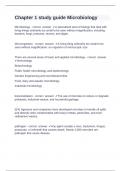
-
Chapter 1 study guide Microbiology Question and answers rated A+
- Exam (elaborations) • 11 pages • 2024
-
Available in package deal
-
- $13.49
- + learn more
Chapter 1 study guide Microbiology Question and answers rated A+ Chapter 1 study guide Microbiology Microbiology - correct answer A specialized area of biology that deal with living things ordinarily too small to be seen without magnification, including bacteria, fungi, protozoa, viruses, and algae. Microorganism - correct answer A living thing ordinarily too small to be seen without magnification; an organism of microscopic size There are several areas of basic and applied microbio...

-
Microbiology Exam #1 (Chapter 1,3,4,5,6) with Complete Solutions
- Exam (elaborations) • 40 pages • 2024
-
- $15.49
- + learn more
Microbiology Exam #1 (Chapter 1,3,4,5,6) with Complete Solutions Microbiology -Answer-The specialized area of biology that deals with organisms too small to be seen with the naked eye 6 major groups of microorganisms -Answer-1. Bacteria 2. Algae 3. Protozoa 4. Helminths 5. Fungi 6. Viruses What do microbiologists study? -Answer-- Cell structure - Growth and Physiology - Genetics - Taxonomy and evolutionary history - Interactions with living and non living environment What are the ...
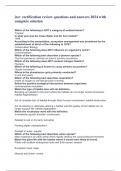
-
icev certification review questions and answers 2024 with complete solution
- Exam (elaborations) • 9 pages • 2024
-
- $13.49
- + learn more
icev certification review questions and answers 2024 with complete solution Which of the following is NOT a category of wetland biome? Tropical In what year was the Clean Water and Air Act created? 1948 According to the presentation, ecosystem management was broadened by the establishment of which of the following in 1978? Conservation Biology Which of the following does NOT influence an organism's niche? Commensalism Which of the following best describes a pioneer species? The fi...
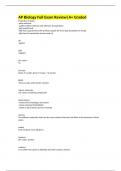
-
AP Biology Full Exam Review|A+ Graded
- Exam (elaborations) • 5 pages • 2024
-
- $10.39
- + learn more
AP Biology Full Exam Review|A+ Graded Properties of Water -polar molecule -capillary effect (cohesion and adhesion, transpiration) -high specific heat -high heat capacity (heat sink-protects aquatic life from large fluctuations in temp) -high heat of vaporization (sweat cools us) pH -log[H+] pOH -log[OH-] pH + pOH = 14 pH scale below 7 is acidic, above 7 is basic, 7 is neutral BAAD "bases accept, acids donate" protons organic molecules any carbon conta...

-
Microbiology Exam #1 (Chapter 1,3,4,5,6) with Complete Solutions
- Exam (elaborations) • 40 pages • 2024
-
- $13.49
- + learn more
Microbiology Exam #1 (Chapter 1,3,4,5,6) with Complete Solutions Microbiology -Answer-The specialized area of biology that deals with organisms too small to be seen with the naked eye 6 major groups of microorganisms -Answer-1. Bacteria 2. Algae 3. Protozoa 4. Helminths 5. Fungi 6. Viruses What do microbiologists study? -Answer-- Cell structure - Growth and Physiology - Genetics - Taxonomy and evolutionary history - Interactions with living and non living environment What are the ...
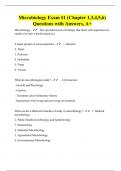
-
Microbiology Exam #1 (Chapter 1,3,4,5,6) Questions with Answers, A+
- Exam (elaborations) • 41 pages • 2024
-
Available in package deal
-
- $13.99
- + learn more
Microbiology - The specialized area of biology that deals with organisms too small to be seen with the naked eye 6 major groups of microorganisms - 1. Bacteria 2. Algae 3. Protozoa 4. Helminths 5. Fungi 6. Viruses What do microbiologists study? - - Cell structure - Growth and Physiology - Genetics - Taxonomy and evolutionary history - Interactions with living and non living environment What are the 6 different branches of study in microbiology? - 1. Medical microb...
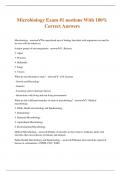
-
Microbiology Exam #1 uestions With 100% Correct Answers
- Exam (elaborations) • 29 pages • 2024
- Available in package deal
-
- $13.49
- + learn more
Microbiology Exam #1 uestions With 100% Correct Answers Microbiology - answerThe specialized area of biology that deals with organisms too small to be seen with the naked eye 6 major groups of microorganisms - answer1. Bacteria 2. Algae 3. Protozoa 4. Helminths 5. Fungi 6. Viruses What do microbiologists study? - answer- Cell structure - Growth and Physiology - Genetics - Taxonomy and evolutionary history - Interactions with living and non living environment What are the 6 differe...
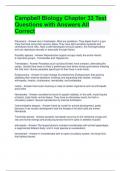
-
Campbell Biology Chapter 33 Test Questions with Answers All Correct
- Exam (elaborations) • 8 pages • 2024
-
Available in package deal
-
- $13.49
- + learn more
Campbell Biology Chapter 33 Test Questions with Answers All Correct Planarians - Answer-live in freshwater. Most are predators. They digest food in a gut. They find food using their sensory lobes. They have light-sensitive eyespots and centralized nerve nets. Have a well-developed nervous system. Are hermaphrodites and can reproduce sexually or asexually through fission. Parasitic species - Answer-Reproductive organs occupy nearly the entire interior. 2 important groups - Trematodes and Tap...
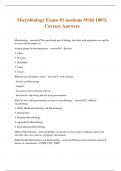
-
Microbiology Exam #1 uestions With 100% Correct Answers
- Exam (elaborations) • 29 pages • 2024
- Available in package deal
-
- $13.49
- + learn more
Microbiology Exam #1 uestions With 100% Correct Answers Microbiology - answerThe specialized area of biology that deals with organisms too small to be seen with the naked eye 6 major groups of microorganisms - answer1. Bacteria 2. Algae 3. Protozoa 4. Helminths 5. Fungi 6. Viruses What do microbiologists study? - answer- Cell structure - Growth and Physiology - Genetics - Taxonomy and evolutionary history - Interactions with living and non living environment What are the 6 differe...

-
ADVANCED PLACEMENT (AP) BIOLOGY: Plant Biology 122 Questions Correctly Answered | 100% Rated
- Exam (elaborations) • 52 pages • 2023
-
Available in package deal
-
- $12.00
- + learn more
ADVANCED PLACEMENT (AP) BIOLOGY: Plant Biology 122 Questions Correctly Answered | 100% Rated Question 1 Which is of the following is not an adaptation/modification that enabled plants to move from aquatic to terrestrial environments as they evolved? Possible Answers: Stomata Thylakoid membranes Cutin Roots and root hairs Correct answer: Thylakoid membranes Question 2 Which structures did not evolve after plants emerged onto land? Possible Answers: Stomata Seeds Cell wal...

Study stress? For sellers on Stuvia, these are actually golden times. KA-CHING! Earn from your study resources too and start uploading now. Discover all about earning on Stuvia


